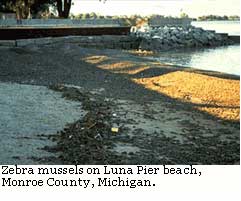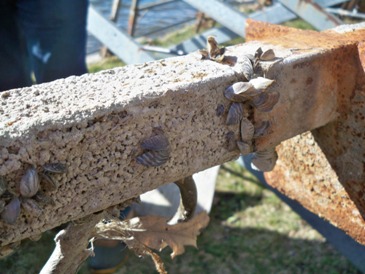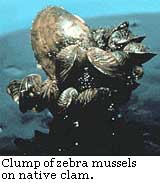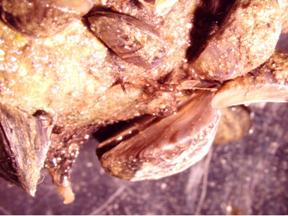Interactions
Since Zebra Mussels are filter feeders,
their presence in an ecosystem creates water
clarity and decreases food supply for other
organisms around them. Zebra Mussels
generally form colonies that cause an even
greater depletion of resources.  More
info on this can be seen on the
adaptation
page.
More
info on this can be seen on the
adaptation
page.
The location of where they live also affects humans. They used the amazing strength of their byssal threads to attach to many different surfaces. Zebra Mussels are known to infest raw water intake pipes and power plant pipes. Since they are generally found in large numbers, they are known to limit water flow causing a large financial impact. They also collect onto the bottom of boat hulls and create drag, and collect on docks, which causes deterioration. The amount of Zebra Mussels usually exceeds 250,000 individuals per square meter. They can cause corrosion of steel and concrete when so many are attached, which affects structural reliability of facilities using these materials. They also have had a large economic impact already.
Many power plants and water users have
had to spend millions of dollars cleaning
out zebra mussels from their facilities.
More money also has been spent on revamping
facilities with special devices to keep
zebra mussels out and to monitor for their
presence. The extremely high costs of these
procedures then gets passed along to the
consumers.
users have
had to spend millions of dollars cleaning
out zebra mussels from their facilities.
More money also has been spent on revamping
facilities with special devices to keep
zebra mussels out and to monitor for their
presence. The extremely high costs of these
procedures then gets passed along to the
consumers.
Since there are so many Zebra Mussels,
they have the ability to attach to native
mussels. This leads to smothering them and
killing them off. This is one of the most
threatening impacts. As many as 10,000 zebra
mussels have attached to a single native
mussel. Our natives have all but
disappeared in Lake St.Clair and the western
basin of Lake Erie. Survival rates of
native
unionoid mussel in the Mississippi
River, Minnesota have been shown to
decrease
significantly with the increase in zebra
mussel numbers. More
interesting facts about Zebra Mussels
can be seen here!
most
threatening impacts. As many as 10,000 zebra
mussels have attached to a single native
mussel. Our natives have all but
disappeared in Lake St.Clair and the western
basin of Lake Erie. Survival rates of
native
unionoid mussel in the Mississippi
River, Minnesota have been shown to
decrease
significantly with the increase in zebra
mussel numbers. More
interesting facts about Zebra Mussels
can be seen here!
Zebra mussels are filtering the Great
Lakes at an increasingly fast rate, causing
the lakes to become very clear. Most people
assume that this increased visibility in the
water must mean the water is cleaner, but
all they have done is filter out all the
algae which normally would be food for
native microscopic organisms.

Zebra mussels do not have many natural predators in North America, but it has been documented that several species of fish and diving ducks have been known to eat them. Predation and resource abundance can strongly affect the structure and dynamics of animal populations within aquatic ecosystems.